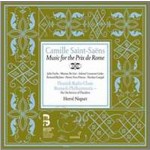
Music for the Prix de Rome
 $44.99
Out of Stock
$44.99
Out of Stock2-4 weeks add to cart
SAINT-SAENS
Music for the Prix de Rome
Julie Fuchs, Marina De Liso, Solenn’ Lavanant Linke, Bernard Richter / Brussels Philharmonic & Flemish Radio Choir, Herve Niquet
[ Glossa / 2 CD ]
Release Date: Thursday 20 January 2011
This item is currently out of stock. We expect to be able to supply it to you within 2 - 4 weeks from when you place your order.
"The performances seem uniformly excellent and the sound quality is first-rate."
(International Record Review)
"[Le retour de Virginie is] a silly enough story but it allows for romantic solos, sea-music, storm-music and quasi-religious prayers; Saint-Saëns's score has little individuality, but all this is deftly handled, with a sure flair for vocal and instrumental writing...the performances seem uniformly excellent and the sound quality is first-rate. As with the Debussy set, the artistic result has proved to be so much more than a musicological exercise."
(International Record Review)
Camille Saint-Saëns and the Prix de Rome… surely a strange bringing together of ideas, given that the composer never gained that coveted award and consequently never took up residence in the famous Villa Medici? All the same, Saint-Saëns entered the competition on two separate occasions and, peculiarly in the history of the competition, twelve years apart: firstly in 1852 and then in 1864. On the first occasion he was still an adolescent, devoted to worshipping the memory of the great Mendelssohn; behind him, by the time of the second occasion, were already a number of his masterpieces later to be confirmed by posterity - and he had become acquainted with Verdi and had also discovered Wagner. If the music he composed for the competition in 1864 was not deemed worthy of being awarded a prize, perhaps that was due to it being full of a troubling and disquieting sense of modernity: there is clearly nothing that the cantata Ivanhoé need fear in a comparison with Il Trovatore… In the period between the two competitions Saint- Saëns concurrently secured for himself a reputation in church music based on a plentiful collection of magnificent motets; proof that it is possible to be successful in religious academicism and unsuccessful in its lyric counterpart (provided we set aside Samson et Dalila!) Hervé Niquet, the Brussels Philharmonic and Glossa are now presenting the second volume in their survey of music composed for the Prix de Rome with the majority of such pieces being previously unrecorded and definitely demanding to become much better-known.